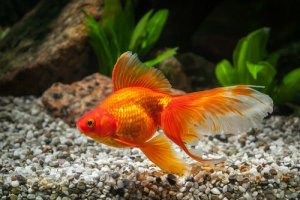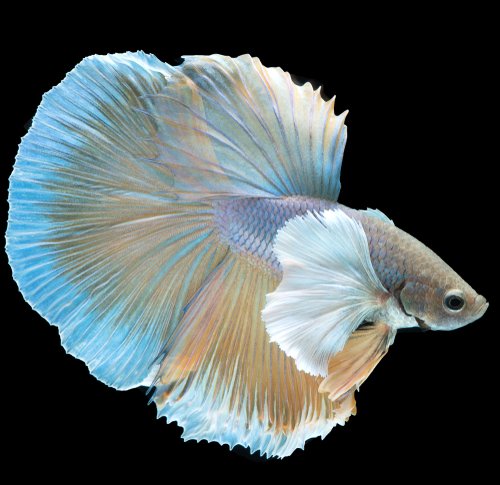
You may have wondered ‘Do betta fish sleep’, and the fact is, these are a very active and entertaining species of fish so it may come as a surprise to see them tucked somewhere in the tank. Yet, on seeing this, you will have discovered that yes, betta fish do indeed sleep. However, this isn’t sleep in the same way as humans sleep, instead, they lower their metabolic rate.
In fact, fish sleep is generally classified as a state of low activity and reduced response to disturbance. Read on for a breakdown of how betta fish sleep, how to tell if your betta fish is sleeping or dead, and ways to keep your aquatic friend happy and healthy.
How Do Betta Fish Sleep?
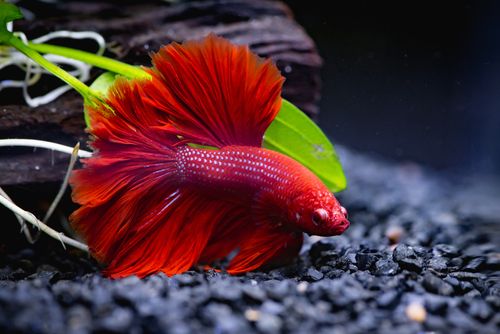
Betta fish don’t sleep in the same way as humans do. Essentially, fish have to be on the lookout for predators as much as possible. This was especially so in the rice paddies in southeast Asia that betta fish originated from, where they could easily have been eaten by a frog or bird.
As a result, these fish don’t enter a full state of unconsciousness. Instead, they simply lower their metabolism so they can rest and conserve energy. Even in this state, they are still very ready to respond to any potential threats.
Betta Fish Sleep And The Lateral Line
What is the lateral line? The lateral line is a super sensitive organ that many species of fish have. It senses things like temperature, water pressure, and vibrations, so it’s a really easy way of telling the fish if any potential threats are approaching.
When betta fish sleep, they are still ready to respond to threats, and sensations picked up by the lateral line will alert the fish of danger. This is why if you startle a betta fish, even if it’s asleep, you will see it quickly wake up to check out what’s going on.
How Long Do Betta Fish Sleep?
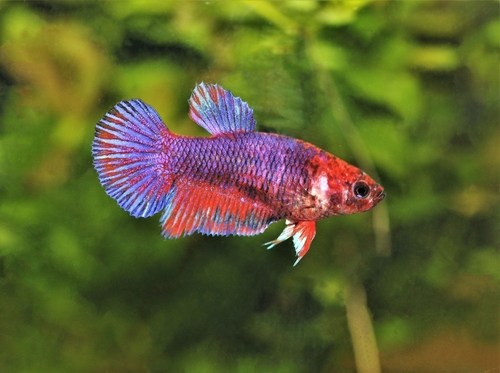
Like humans, betta fish both sleep at night and nap during the day. The overall amount of time that a betta fish sleeps can be anything from 12-14 hours, but this may not necessarily be all in one go. In fact, your betta is most likely to take short naps during the day and then sleep for a longer period at night.
Do Betta Fish Sleep With The Light Off?
Yes, for their main bout of sleep, betta fish prefer to have the light off. Just like humans, these fish would have timed their sleep cycle to the natural setting and rising of the sun. Therefore, making sure the tank light is turned off for the duration of the night helps synchronize their body clock and ensure they are able to get plenty of rest while feeling safe from predators.
Do Male And Female Betta Fish Sleep Differently?
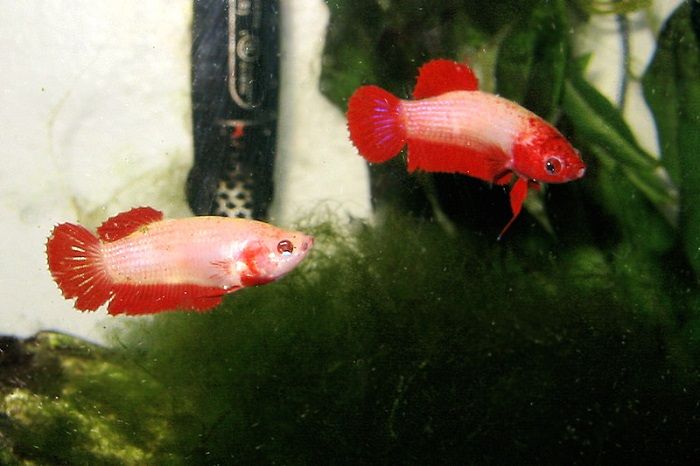
The male betta fish tends to be marginally more popular to keep because of its showy fins, however, sorority tanks with a group of female bettas are also a common option. In a sorority tank, each female betta will establish her place in the tank hierarchy, especially by choosing territories. Betta fish are idiosyncratic, their place in the hierarchy tends to be influenced by energy metabolism, and likewise, they will all sleep slightly differently.
Another difference between male and female betta fish sleep is that, of course, your female betta fish can become pregnant. If this is the case, and she is carrying eggs, she may be more tired than usual, and have to stop more often to conserve energy. This is normal, and you can boost her energy levels by feeding her protein at more frequent intervals.
How Do You Know If A Betta Fish Is Sleeping?
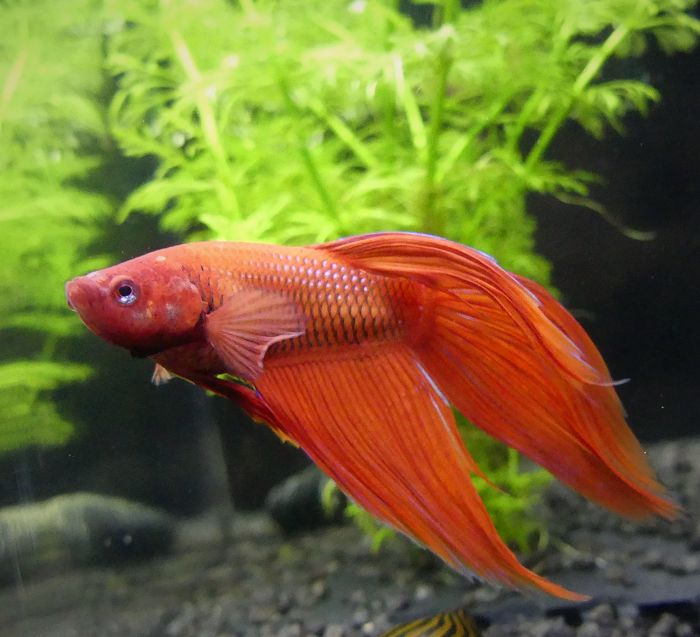
Whether a betta fish is sleeping or dead is a question that often crops up for novice betta fish owners. Fortunately, there are lots of ways you can tell that a betta fish is simply asleep, by looking at the wider context and how they are interacting with their surrounding environment. This includes where they are, and how they are moving.
Where Do Betta Fish Sleep?
What is exciting for many betta owners is to discover the wide variety of interesting places that your betta fish sleeps in. One of their favorite places is in something called a leaf hammock. Essentially, your fish will hang out in the pocket of still, calm water on top of a broad, flat leaf in order to catch some shut-eye.
In fact, you can now buy specialized ‘leaf hammocks’ comprised of a fabric leaf that attaches to the side of the tank with a suction cup.
Apart from this, healthy betta fish also sleep on the bottom of the tank, nestled in between plants, next to stones, and in caves or hidey-holes. A sick fish, on the other hand, will be less peaceful and more listless, and will possibly struggle to swim when it’s not asleep.
Do Betta Fish Sleep At The Top Of The Tank?
Yes! One significant characteristic of betta fish is that they, like other fish in the sub-order anabantoidei, have a specialized labyrinth organ that allows them to breathe air. You may occasionally see your fish sleeping at the top of the tank, and this is perfectly normal because they occasionally take gulps of air from the surface.
If your betta fish likes using a leaf as a hammock, you may also find they gravitate towards the top of the water amongst the leaves of any aquatic plants you may have provided. You may even see them building a bubble nest here!
Can Betta Fish Sleep With The Light On?
Betta fish can sleep with the light on, and it is not uncommon to catch them taking a nap during the daytime. However, like any creature their sleep-wake cycle is influenced by night and day and as a result, it’s better to turn the lights off overnight so that they can get some proper rest. In fact, instinctively your betta will know that when the lights go off, this is a time to shut down and sleep.
Causes Of Betta Fish Sleeping A Lot
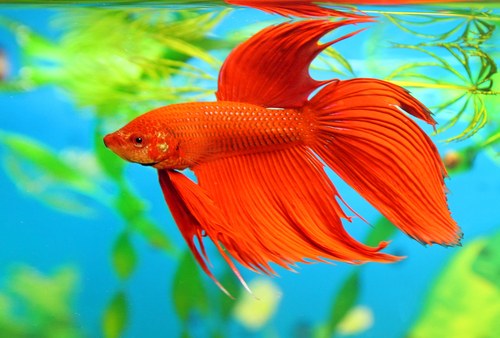
Occasionally, you may notice that your betta fish is sleeping longer than usual – around 14 hours a day instead of 11 or 12. There can be many causes for this and though it isn’t always super serious, it’s something that is best to keep an eye on due to the fact it can be a sign certain things, like your fish’s diet, are in need of attention.
1. Stress
When a betta fish or any animal is stressed, it inevitably will use up more energy. This energy depletion may mean that your fish starts sleeping for longer. To solve this, it’s best to remove the source of the stress. In a betta sorority tank, this can be hierarchical disputes.
With either gender, water conditions can also cause stress, and so can the outside environment – for example, if you have a pet cat that is watching your fish.
2. Disease
Another cause of betta fish sleeping a lot is disease. To determine whether this is the case, look out for other signs that your fish is not well. This can include general listlessness and lethargy, even when it is awake, as well as symptoms like your betta fish not eating or losing color.
3. Malnutrition
Fish lethargy is often taken as one of the first signs of disease, however, it is also an indication of malnutrition and nutritional deficiencies. If malnourished, your fish simply won’t have enough energy to do much more than hang out at the bottom of the tank.
This can make it look after if it is sleeping a lot, even if in reality it is awake. Betta fish can’t go for long without eating, so if you suspect malnutrition, it’s best to immediately feed some protein-rich foods, starting with small amounts at first.
4. Growth
One reason your fish is sleeping a lot can simply be because it is growing! Juvenile betta fish may still have some time before they reach full size, and growth takes up a lot of energy, so it’s natural that your fish may need to recharge more than usual.
You can help this process by feeding a protein-rich diet comprised of a combination of not just pellets but also live foods such as daphnia and brine shrimp, either in fresh or frozen form. Some people supplement with pieces of chopped-up meat like salmon or beef heart, although these can quickly make the water dirty.
Factors That Affect Betta Fish Sleep
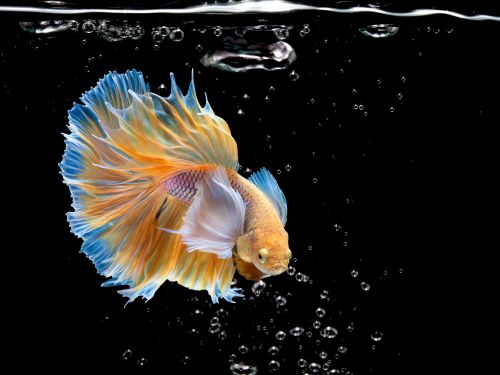
If your betta fish is sleeping a lot, or even if you suspect your fish isn’t getting enough sleep, rest assured that there are lots of factors that can affect this. You can therefore very easily alter your fish’s environment so they have the optimum conditions, the correct amount of sleep included.
1. Diet
Betta fish are obligate carnivores. This means that they can only eat animal-based foods. For the betta, which has a small mouth, this generally means insects and the free-swimming larvae of other invertebrates. Although it’s good to use a pellet food to form the base of their diet, sometimes better fish need more nutrition and this can contribute to how much they sleep.
The blood worms, daphnia, and brine shrimp you commonly find frozen or fresh in any big aquatics store can be a great option if you think your fish isn’t getting enough energy.
Conversely, your betta fish may have digestive issues that are slowing it down and make it sleep a lot. A fish with a rounded stomach that is not a pregnant female can be a sign that it is constipated.
In this case, it’s likely your fish will exhibit lethargy, including sleeping more. In this case, reduce feeding. Some fish keepers allow one day where they don’t feed their betta fish, and this can help clear out their digestive system.
2. Health
Sickness is a big contributor to betta fish sleep. Simply put, lethargy is one of the early warning signs of many fish diseases, as well as poor water quality.
If you suspect this, it’s easy to test the water. Yet, to prevent it in the first place, opt for a tank on the larger side. You may have heard that an ideal betta fish tank is 10 gallons or 38 liters. The fact that betta fish can breathe oxygen from the surface has led many to believe that they don’t need a large volume of water.
This isn’t the case! A tank of a minimum of 20 gallons or 76 liters is best, and if it is wider than it is tall, you’re also giving your fish lots of room to breathe air.
3. Age
Just like humans, fish metabolism slows down as they age. Therefore, if your fish is older, they may simply require more rest.
This isn’t necessarily a sign that your betta fish is dying. If they still interact with their environment and take an interest in their food, then it might just be that they don’t have as much energy as they used to.
4. Gender
Whilst this may not seem immediately obvious, a pregnant female betta fish may need more sleep than a male or non-pregnant female. If you’re wondering how betta fish mate, note that in the breeding period, both males and females will need more food.
If your female betta fish is sleeping a lot and you suspect she may be carrying eggs, check to see if her stomach is bigger or if you can see a small white dot on her abdomen. This organ is called the ovipositor and is responsible for laying eggs. Pregnant female fish in this state are technically referred to as gravid.
Final Thoughts
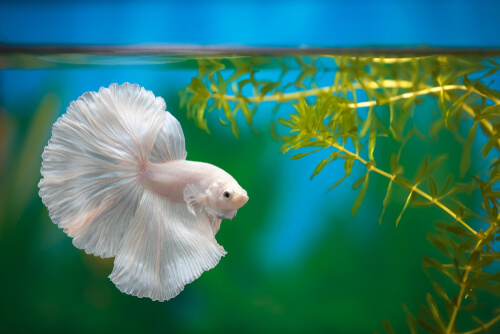
We don’t often think of fish as animals that sleep in the same way humans do, but once you start observing your betta’s behavior, you will see that they have many of the same needs as our own. Ultimately, if you’re unused to betta fish sleeping patterns, it can be hard to tell what should be taken seriously or not.
Yet, once you learn a little about their sleep habits, you will gain a broader understanding of when to worry, plus become more familiar with these fascinating creatures.


